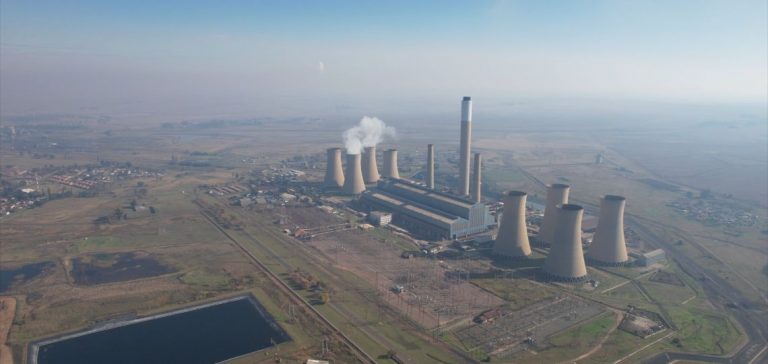The Komati coal plant, located in Middelburg, east of Johannesburg, closed its doors in 2022 to be converted into a flagship energy transition site in South Africa. However, two years later, the conversion is far from complete, and the project is now a source of controversy.
Komati was one of the oldest power plants in the country, supplying 121 megawatts (MW) of electricity to the national grid. Its closure, along with that of five other plants planned by 2030, is part of the Just Energy Transition Partnership (JETP) implemented by the South African government in collaboration with international partners. The project benefits from a $497 million funding from the World Bank to transform the site into an energy complex capable of producing 150 MW of solar, 70 MW of wind, and 150 MW of battery storage.
Delays and Implementation Challenges
Despite the project’s scale, the conversion work has not yet truly begun, due to administrative delays and poor organization. The plant’s general manager, Theven Pillay, admits that mistakes were made from the start: “We should have anticipated more. We consider that this project is not a success at the moment.”
For her part, Deputy Minister of Energy Samantha Graham acknowledged that the closure has left employees in a critical situation. Before its closure, Komati employed 393 people, but only 162 of them still work on-site, with others being reassigned or accepting severance packages.
A Difficult Social Impact to Manage
The closure of Komati also had a major impact on the small mining town of Middelburg, where the plant was the main source of employment. Many houses have been abandoned, and the remaining workers face significant financial challenges. Sizwe Shandu, an employee since 2008, describes the situation as a trauma for local families. “We now rely on government aid to meet our needs,” he says.
Eskom, the state-owned electricity company that operates the plant, plans to create 363 permanent jobs and 2,733 temporary jobs on the site, but the conversion projects, such as fish farming and vegetable growing integrated with solar installations, are progressing slowly. Seven people have been trained for these activities, far short of the 21 initially planned.
An Example for Future Closures
The experience of Komati has become a case study for the authorities who are trying to avoid the same mistakes during the next plant closures. The delays have revealed the complexity of conversion and the need to better plan the transition of workers before shutting down facilities.
Since the launch of the JETP in South Africa, other countries such as Indonesia, Vietnam, and Senegal have entered into similar partnerships. However, the pace of implementation remains slow, and few plants have been closed to date.
Towards a Sustainable Energy Mix
South Africa remains heavily dependent on coal, which accounts for about 80% of its electricity production. “We still have 200 years of coal reserves in our subsoil,” says Eskom. The country plans to continue exploiting these resources while gradually increasing the share of renewables in the energy mix.
Today, only 7% of South Africa’s energy comes from renewable sources, an increase of 1% compared to ten years ago. Nevertheless, the government hopes to achieve a “stable and sustainable energy mix,” while balancing international pressures and its own economic imperatives.






















